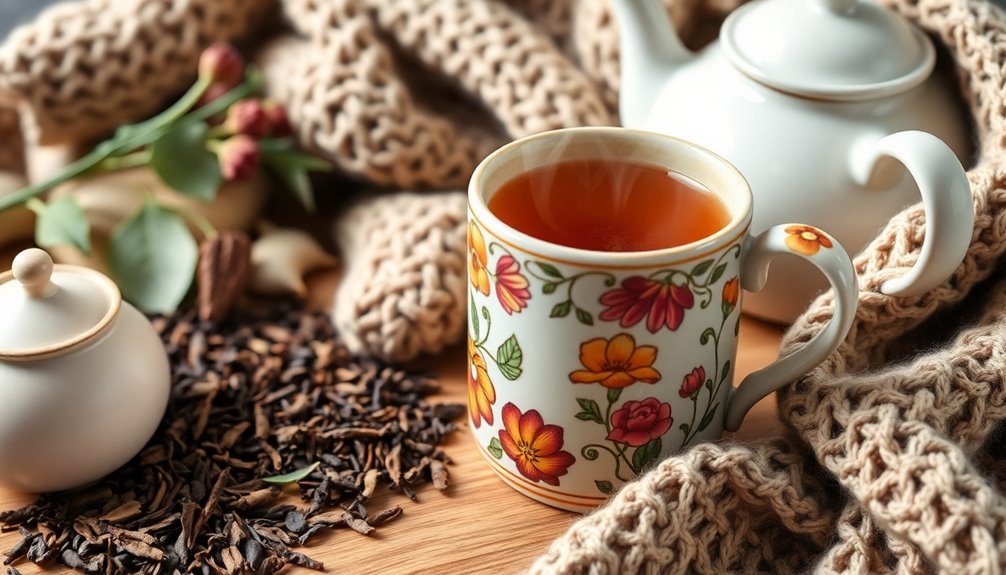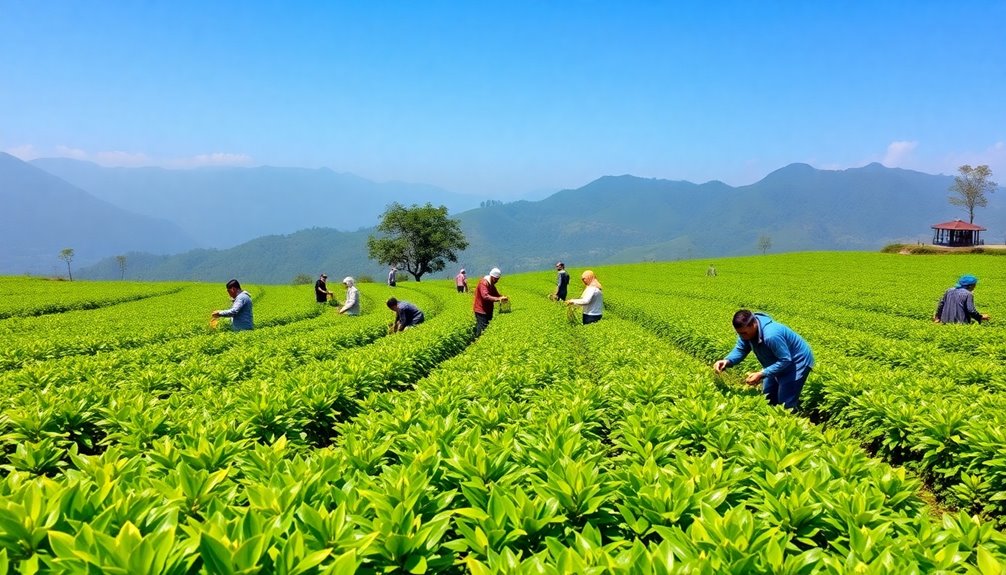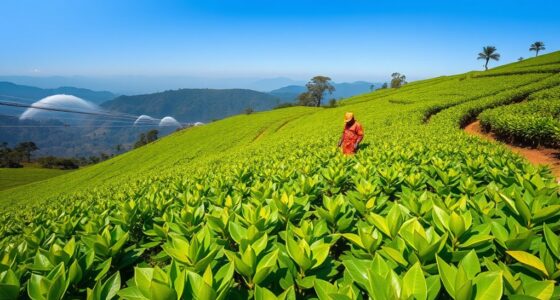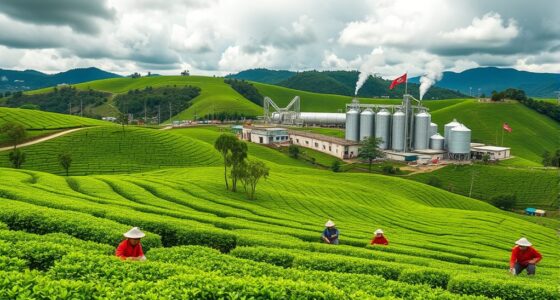In 2025, you’ll see exciting tea trends emerge, shaped by health-conscious choices and sustainability. Gen Z’s love for unique flavors and ready-to-drink options will drive innovation in the market. Expect a rise in functional teas, offering benefits like stress relief and immunity support. Brands are focusing on eco-friendly practices and ethically sourced ingredients, appealing to your desire for transparency. Seasonal and limited-edition blends will capture adventurous palates too. This fusion of health, flavor, and ethics is steering the tea landscape toward a vibrant future, and there’s plenty more to explore about what’s brewing.
Key Takeaways
- Increased demand for functional teas supporting health benefits like immunity and stress relief is expected to shape product offerings.
- The rise of unique flavors and seasonal specialties will cater to adventurous palates, enhancing consumer engagement.
- Sustainability and ethical sourcing will become essential, with brands adopting eco-friendly practices and transparent supply chains.
- The convenience-driven segment, including ready-to-drink teas and tea pods, will continue to grow as consumers prioritize ease of use.
- Gen Z’s influence on tea consumption will drive innovation, reflecting their preferences for health-oriented and social experiences.
Introduction
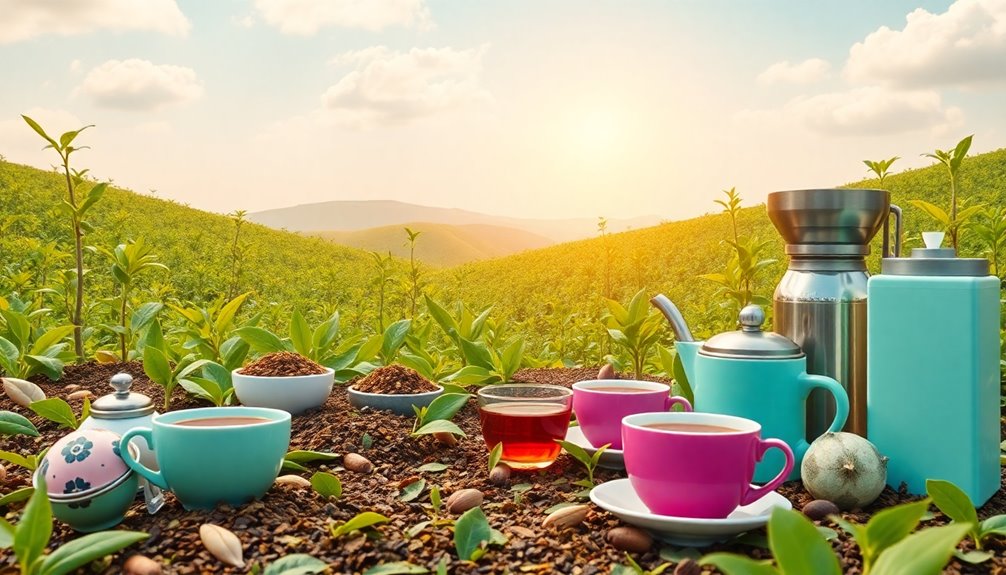
The tea industry’s evolution is fascinating, especially as we look ahead to 2025. You’ll notice the global tea market is shifting rapidly, driven by changing consumer preferences and a growing focus on health benefits.
Innovative products, such as ready-to-drink (RTD) teas and savory blends, are gaining popularity among health-conscious individuals like you. Expect to see unique flavors hitting the shelves, including intriguing options like Astaxanthin tea and metabolism-friendly ingredients such as cinnamon.
These offerings reflect a strong demand for beverages that not only taste good but also contribute positively to your well-being. Major brands are likely to adapt by introducing Nespresso-compatible tea lines, making your tea experience more convenient and sustainable.
As Gen Z continues to engage with tea, the landscape will shift even further. Functional teas infused with adaptogens will probably rise in popularity, catering to your desire for drinks that support immunity and reduce stress. One beverage to watch is yerba mate, known for its rich antioxidants and potential health benefits.
This focus on health and wellness, combined with innovative flavor profiles, promises to redefine how you experience tea. So, whether you’re sipping solo or enjoying a social moment, 2025 will bring exciting changes to the world of tea.
Gen-Z Tea Consumption Habits

Gen Z is reshaping the tea landscape with their distinctive consumption habits. Approximately 37% of you regularly consume tea, signaling a significant shift towards this beverage among younger demographics.
You’re drawn to the social aspect of tea, influenced by café culture, which makes tea consumption a shared experience. Unique tea blends and innovative formats, like ready-to-drink (RTD) teas and cold brews, are particularly appealing, offering convenience while satisfying your adventurous palate. Flower teas, in particular, are gaining traction for their health benefits that resonate with your wellness-focused lifestyle.
Your health-conscious choices play a vital role in this trend, as you seek teas that provide functional benefits. Whether it’s immunity support or stress relief, you value options that contribute to your overall wellness. The allure of unique flavor profiles, including adaptogen-infused teas, reflects your desire for both taste and health. Additionally, many of you are exploring herbal teas that offer anti-inflammatory properties to enhance your well-being.
As you embrace these new tea consumption habits, brands are responding with a wider variety of offerings tailored specifically for you. This shift not only highlights your preferences but also paves the way for innovative products that cater to the ever-evolving tea landscape.
Get ready for a tea experience that’s as diverse and dynamic as you are!
Functional Tea Market Growth
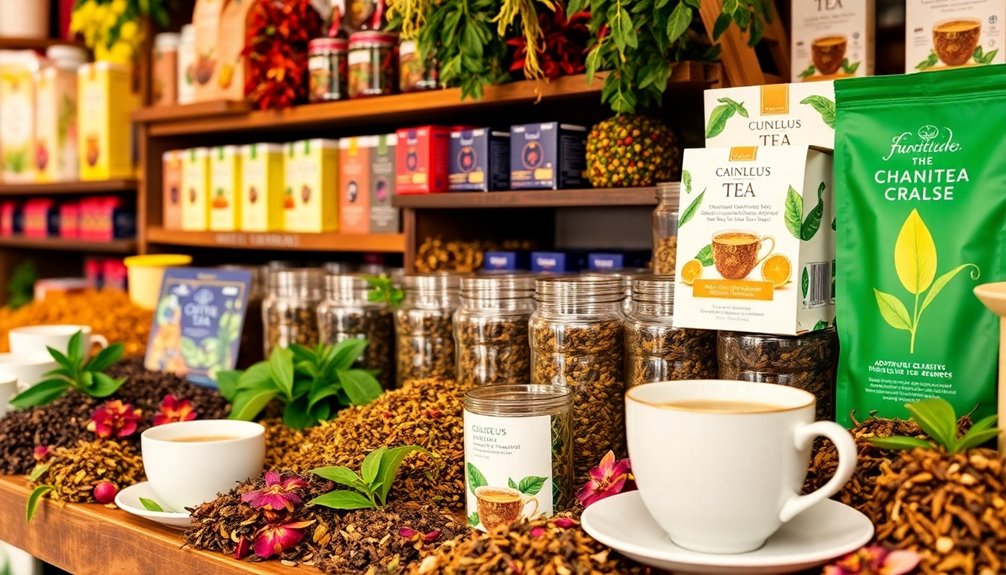
Functional tea is rapidly gaining traction in the beverage market, thanks to your growing interest in health-oriented options. This functional tea market growth is largely driven by consumer demands for teas that offer specific health benefits, like immune support and stress relief. Sleep and relaxation techniques, which enhance overall well-being, can complement these health benefits and improve your experience with functional teas. Additionally, incorporating essential oils into functional teas can further enhance their therapeutic effects. Research suggests that certain teas can also contain antioxidants that combat oxidative stress, making them even more appealing.
One in five UK consumers now prefer tea products that provide these additional advantages, indicating a clear shift toward wellness-oriented beverages.
The sober curious movement is also influencing your tea choices, with nearly half of Germans viewing tea as a refreshing alternative to alcohol. Major brands like Twinings and Tetley are responding to this trend by launching health-focused tea ranges, including those aimed at menopause support. Techniques for maintaining high vibrational energy can further enhance the positive effects of these wellness-focused beverages.
These offerings reflect an increasing consumer desire for functional products that align with their wellness goals.
As we move toward 2025, expect to see even more innovations in functional teas. Emerging flavors and unique ingredients tailored to meet specific health needs will continue to capture your attention. Incorporating ingredients like apple cider vinegar may enhance the health benefits of these teas by aiding digestion and metabolism.
With the functional tea market on the rise, you’re likely to find more options that resonate with your health-conscious lifestyle.
Tea-Infused Wellness Beverages Rise
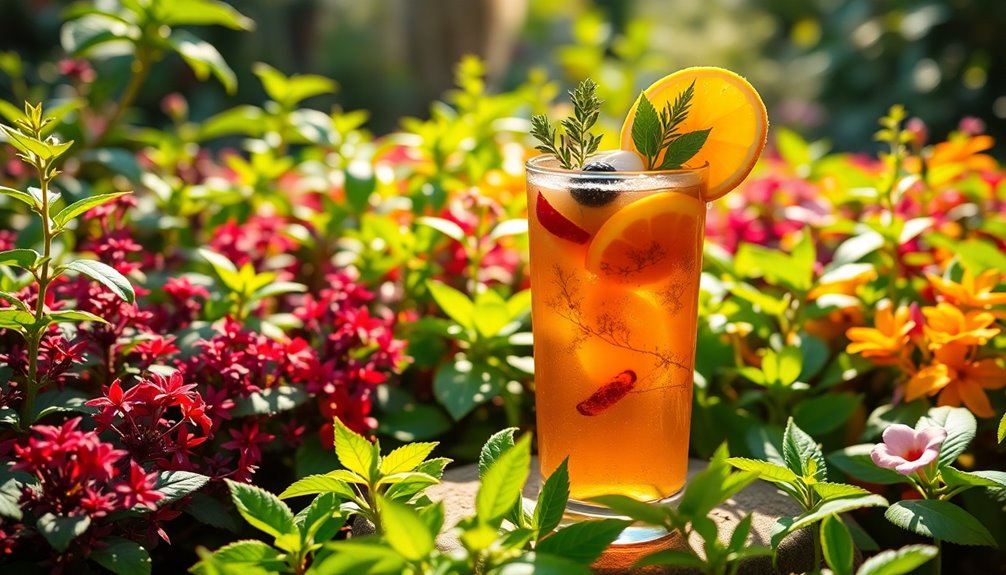
As health trends evolve, tea-infused wellness beverages are becoming a popular choice for those prioritizing well-being. The rise of the sober curious movement is driving interest, with nearly half of Germans considering tea as an alternative to alcoholic drinks.
You’ll find that functional teas, which provide specific health benefits like relaxation and stress relief, are increasingly favored—one-fifth of UK consumers prefer teas with added health properties.
Brands like Twinings and Tetley are leading this growing trend, launching targeted health-focused products, including specialized blends for women’s health during menopause. This reflects a broader shift in product development that caters to health-conscious consumers seeking more than just a beverage; they want functional benefits.
The demand for natural energy sources also positions tea-infused wellness beverages as essential, especially for those looking for energy-boosting benefits in ready-to-drink formats.
With innovations in tea-based beverages focusing on immunity and overall well-being, it’s clear that tea market trends are shifting. You can expect these wellness drinks to dominate the market as consumers increasingly prioritize their health and lifestyle choices.
Sustainability vs. Sourcing Ethics
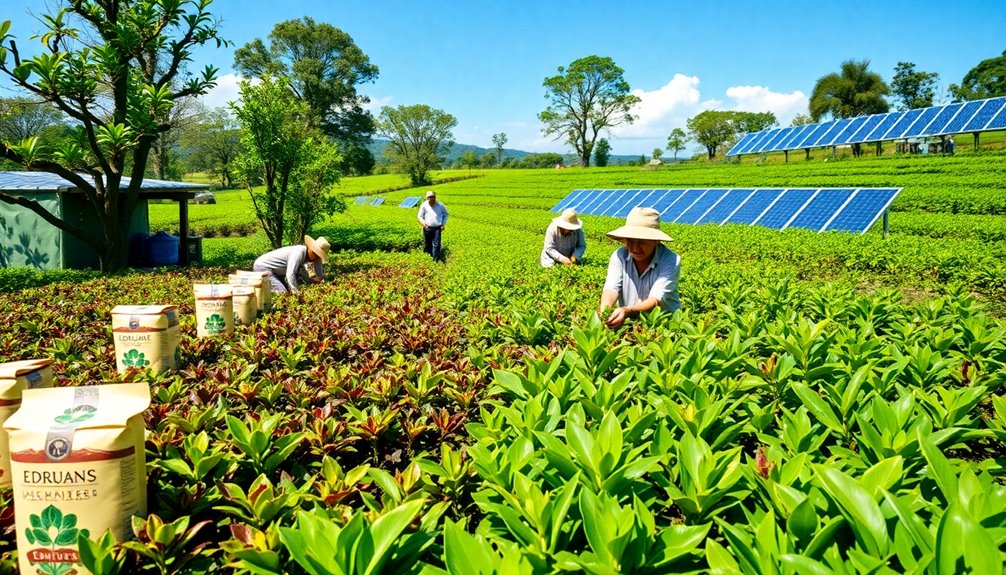
While consumers increasingly prioritize health and wellness in their beverage choices, they’re also becoming more conscious of the environmental and ethical implications of their purchases.
Sustainability and sourcing ethics are now at the forefront of the tea industry. Over a third of global tea launches feature eco-friendly packaging, reflecting strong consumer demand for sustainable practices. This trend is particularly evident among German tea drinkers, with 50% willing to pay extra for ethically sourced tea.
Regenerative farming practices are gaining traction as brands aim to maintain soil health and biodiversity, aligning with your expectations for reduced carbon footprints.
Additionally, about 25% of Thai consumers are ready to pay more for plastic-free packaging, signaling a significant market shift toward sustainability.
Brands are also enhancing transparency in their supply chains, responding to your demand for ethical sourcing and sustainability in tea production.
As you make informed choices, your preferences are shaping the future of the tea market, pushing brands to adopt practices that prioritize both sustainability and sourcing ethics.
Practical Applications
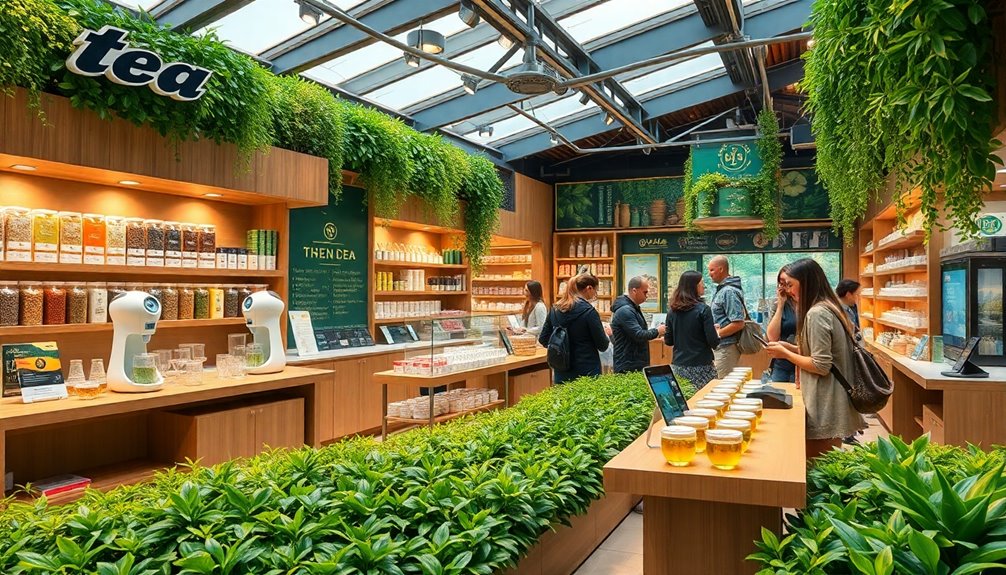
Numerous innovative product formats are set to reshape the tea landscape in 2025, making it easier for you to enjoy your favorite beverages.
Expect a surge in ready-to-drink (RTD) teas and tea pods compatible with coffee machines, catering to a market that values convenience and sustainability.
As you explore new product launches, seasonal specialties like premium matcha and autumn pumpkin spice tea will catch your attention, appealing to your health-conscious and flavor-seeking preferences.
Savory teas will also make their mark, providing unique flavor experiences while incorporating metabolism-friendly ingredients.
If you’re among the sober curious, you’ll find non-alcoholic tea-based beverages emerging as a tasty alternative, tapping into your desire for health-conscious options.
Brands are responding to your growing concern for sustainability by adopting eco-friendly packaging and regenerative farming practices, ensuring that your choices are ethically sourced and environmentally sound.
With these trends, you’ll have a wide range of innovative tea options that align with your values and lifestyle preferences, making 2025 an exciting year for tea enthusiasts like you.
Conclusion
As we move into 2025, staying ahead of these tea trends will keep you in tune with the evolving market. Embrace Gen-Z’s unique consumption habits, explore the rise of functional and wellness-focused teas, and pay attention to sustainability and ethical sourcing. By understanding these shifts, you can make informed choices that resonate with your values and preferences. So, whether you’re a tea enthusiast or just curious, there’s plenty to discover in the world of tea!


